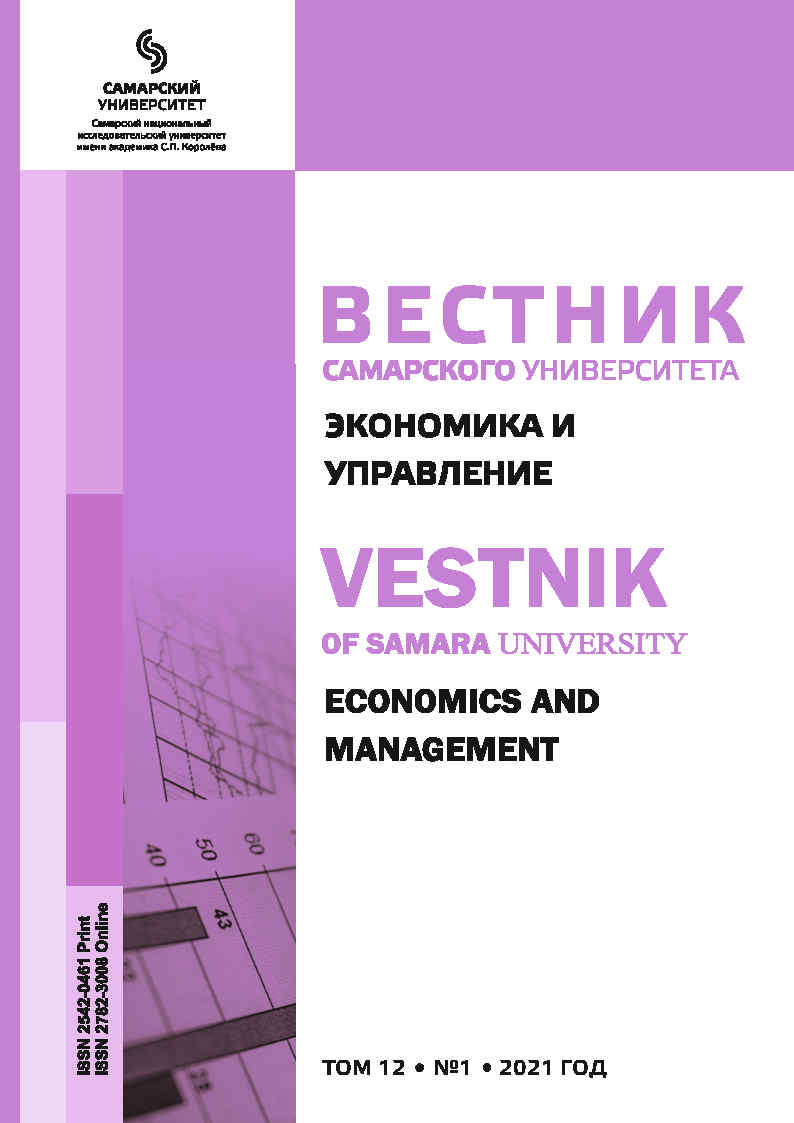Professional self-determination of youth in the context of socio-economic reality
- Authors: Nechitaylo A.A.1, Deptsova T.Y.1, Gnutova A.A.1, Priadilnikova N.V.1, Nikitina A.S.1
-
Affiliations:
- Samara National Research University
- Issue: Vol 12, No 1 (2021)
- Pages: 99-107
- Section: HUMANE RESOURCES MANAGEMENT
- URL: https://journals.ssau.ru/eco/article/view/8652
- DOI: https://doi.org/10.18287/2542-0461-2021-12-1-99-107
- ID: 8652
Cite item
Full Text
Abstract
The main factors influencing the professional self-determination of university entrants and students are analyzed, the dynamics of the integration processes of universities with the domestic labor market is traced. The authors of the article tried to assess the competence status of a university graduate, which affects its implementation in the labor market. The problem of revising the criteria for assessing the quality of educational services within the framework of «regulatory guillotine» is comprehended. The article analyzes the effectiveness
of creation and functioning of flagship universities, their potential in creating real competition for the capital's educational institutions due to the ability to provide regional labor markets with qualified scientific and professional personnel, in demand for solving the problem of developing a particular subject of the federation. The problems of conjugation of Federal state standards of higher education and professional standards, resulting from an insufficiently coordinated approach to the classification of areas of professional activity, are considered. The need to strengthen the connection between educational institutions and the real sector of the economy is emphasized. According to the authors, one of the aspects of solving this problem is the participation of employers both in the development of professional standards and in the preparation of educational programs, in order to maintain the composition of competencies in an up-to-date state that meets the real needs of employers.
About the authors
Alexander A. Nechitaylo
Samara National Research University
Author for correspondence.
Email: alik.51@mail.ru
ORCID iD: 0000-0003-3854-1542
Doctor of Economics, professor, professor of the Department of Publishing and Book Distribution
Russian Federation, 34, Moskovskoye shosse, Samara, 443086, Russian Federation.Tatiana Yu. Deptsova
Samara National Research University
Email: depcovat@mail.ru
ORCID iD: 0000-0003-0347-5231
Candidate of Pedagogical Sciences, associate professor, head of the Department of Publishing and Book Distribution
Russian Federation, 34, Moskovskoye shosse, Samara, 443086, Russian Federation.Anna A. Gnutova
Samara National Research University
Email: lola_red@mail.ru
ORCID iD: 0000-0003-2317-804X
Candidate of Economic Sciences, associate professor, associate professor of the Department of Publishing and Book Distribution
Russian Federation, 34, Moskovskoye shosse, Samara, 443086, Russian Federation.Natalia V. Priadilnikova
Samara National Research University
Email: tempus-samara@mail.ru
ORCID iD: 0000-0001-6692-2858
Candidate of Philological Sciences, associate professor, associate professor of the Department of Publishing and Book Distribution
Russian Federation, 34, Moskovskoye shosse, Samara, 443086, Russian Federation.Anna S. Nikitina
Samara National Research University
Email: anikitina036@gmail.com
ORCID iD: 0000-0003-4962-0166
editor of the publishing house of Samara National Research University
Russian Federation, 34, Moskovskoye shosse, Samara, 443086, Russian Federation.References
- Order of the Government of the Russian Federation dated June 24, 2017 № 1325-r «On the action plan for the implementation of the Strategy of science and technology development of the Russian Federation for 2017–2019 (first step)». Retrieved from: http://www.garant.ru/products/ipo/prime/doc/71609216/#ixzz4vITBjSz8 (accessed 10.11.2020). (In Russ.)
- Professional standards: Hardware and software complex of the All-Russian Research Institute of Labor of the Ministry of Labor of Russia. Retrieved from: http://profstandart.rosmintrud.ru/obshchiy-informatsionnyy-blok/natsionalnyy-reestr-professionalnykh-standartov/reestr-professionalnykh-standartov/ (accessed 12.12.2020). (In Russ.)
- Elina E.G., Kovtun E.N., Rodionova S.E. Russian higher education in conditions of professional standardization: experience, challenges, risks. Vysshee obrazovanie v Rossii = Higher Education in Russia, 2019, no. 6, pp. 9–27. DOI: http://doi.org/10.31992/0869-3617-2019-28-6-9-27. (In Russ.)
- Reform and development of higher education. Policy document. Paris: Izd-vo IuNESKO, 1995, 49 p. (In Russ.)
- Presidential Address to the Federal Assembly. Available at: http://kremlin.ru/events/president/news/62582 (accessed 17.12.2020). (In Russ.)
- Pokusaenko M.A., Volchik V.V. Quality of higher education in the context of institutional change. Journal of Economic Regulation, 2019, vol. 10, no. 2, pp. 121–131. DOI: http://doi.org/10.17835/2078-5429.2019.10.2.121-131. (In Russ.)
- Skalaban I.A., Osmuk L.A., Kolesova O. V., Cherepanov G. M. Roads Old and New: Educational Strategies in University Choice by Russian Students. Vysshee obrazovanie v Rossii = Higher Education in Russia, 2020, no. 2, pp. 50–62. DOI: https://doi.org/10.31992/0869-3617-2020-29-2-50-62.
- Federal Law Concerning Education in the Russian Federation dated December 29, 2012 № 273-FZ (adopted by the State Duma of the Federal Assembly of the Russian Federation on December 21, 2012) – text version of the law. Available at: http://www.consultant.ru/document/cons_doc_LAW_140174. (In Russ.)
- On the approval of qualification levels in order to develop draft professional standards: order of the Ministry of Labor and Social Protection of the Russian Federation № 148n dated 12.04.2013. Available at: https://mintrud.gov.ru/docs/mintrud/orders/48 (accessed 19.12.2020). (In Russ.)
Supplementary files










